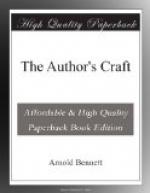At the first rehearsal, and for many rehearsals, to an extent perhaps increasing, perhaps decreasing, the dramatist is forced into an apologetic and self-conscious mood; and his mien is something between that of a criminal who has committed a horrid offence and that of a father over the crude body of a new-born child. Now in truth he deeply realises that the play is a collaboration. In extreme cases he may be brought to see that he himself is one of the less important factors in the collaboration. The first preoccupation of the interpreters is not with his play at all, but—quite rightly—with their own careers; if they were not honestly convinced that their own careers were the chief genuine excuse for the existence of the theatre and the play they would not act very well. But, more than that, they do not regard his play as a sufficient vehicle for the furtherance of their careers. At the most favourable, what they secretly think is that if they are permitted to exercise their talents on his play there is a chance that they may be able to turn it into a sufficient vehicle for the furtherance of their careers. The attitude of every actor towards his part is: “My part is not much of a part as it stands, but if my individuality is allowed to get into free contact with it, I may make something brilliant out of it.” Which attitude is a proper attitude, and an attitude in my opinion justified by the facts of the case. The actor’s phrase is that he creates a part, and he is right. He completes the labour of creation begun by the author and continued by the producer, and if reasonable liberty is not accorded to him—if either the author or the producer attempts to do too much of the creative work—the result cannot be satisfactory.
As the rehearsals proceed the play changes from day to day. However autocratic the producer, however obstinate the dramatist, the play will vary at each rehearsal like a large cloud in a gentle wind. It is never the same play for two days together. Nor is this surprising, seeing that every day and night a dozen, or it may be two dozen, human beings endowed with the creative gift are creatively working on it. Every dramatist who is candid with himself—I




